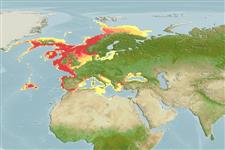Amphiura chiajei Forbes, 1845
| Native range | All suitable habitat | Point map | Year 2050 |

|
| This map was computer-generated and has not yet been reviewed. |
| Amphiura chiajei AquaMaps Data sources: GBIF OBIS |
Google image |
No photo available for this species.
Classification / Names Populärnamn | synonymer | CoL | ITIS | WoRMS
Ophiuroidea | Amphilepidida | Amphiuridae
Environment: milieu / climate zone / djupintervall / distribution range Ekologi
; djupintervall 2 - 1200 m (Ref. 85345). Temperate
Distribution Länder | FAO områden | Ekosystem | Förekomster | Utplanteringar
Atlantic and the Mediterranean Sea: England. Temperate and subtropical.
Length at first maturity / Size / Weight / Age
Könsmognad: Lm ? range ? - ? cm
Life cycle and mating behavior Könsmognad | Reproduktion | Lek | Eggs | Fecundity | Larvae
Main reference
referenser | Koordinator | Medarbetare
Jennings, S., J. Lancaster, A. Woolmer and J. Cotter 1999 Distribution, diversity and abundance of epibenthic fauna in the North Sea. Journal of the Marine Biological Association of the UK 79:385-399. (Ref. 3123)
IUCN Red List Status
(Ref. 130435: Version 2025-1)
CITES status (Ref. 108899)
CMS (Ref. 116361)
Threat to humans
Human uses
| FishSource |
Verktyg
Ytterligare information
Max. ages / sizes
Length-weight rel.
Length-length rel.
Length-frequencies
Mass conversion
Abundans
Internet-källor
BHL | BOLD Systems | CISTI | DiscoverLife | FAO(Publication : search) | Fishipedia | GenBank (genome, nucleotide) | GloBI | Gomexsi | Google Books | Google Scholar | Google | PubMed | Tree of Life | Wikipedia (Go, sök) | Zoological Record


